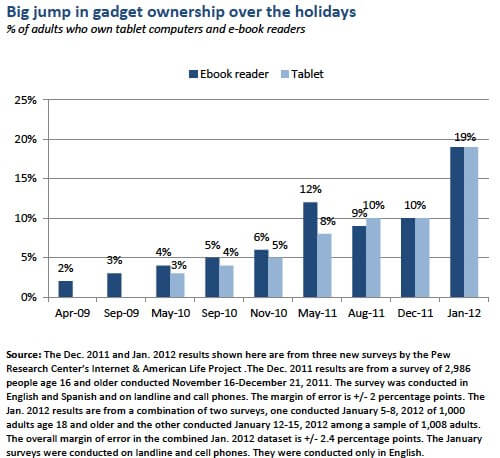
The recent 2011 holiday gift-giving season was a lucrative one for the digital device industry, according to a report by Pew Internet & American Life. Between mid-December and January, the number of respondents in a survey reporting tablet or dedicated e-reader ownership jumped from 10% of U.S. households to 19% of those queried for both types of devices, while as many as 29% of U.S. adults one at least one of the devices. This news was a welcome result for the manufacturers who saw stagnant fall sales.
The findings of the report also broke down the ownership of these devices by gender, educational level, and household income. The study found the men were more likely to own a tablet while women tended to prefer a dedicated e-reader device. It also reported that households with higher income levels and adults with higher educational levels were more likely to own either or both of those devices.
GoodEReader reported over the summer about the instance of women using dedicated e-readers or minimalist tablets like the Nook Color, as evidenced by the marketing campaign by Barnes&Noble aimed at female readers. Some of the reasons at the time revolved around the simplicity of e-readers and the ease of use, factors that weighed in heavily when B&N introduced the Simple Touch Reader to its line of Nooks.
While the project is aimed at studying how consumers purchase and use tablets and e-readers, a grant from the Bill and Melinda Gates Foundation is supporting the project in order to determine how consumers interact with these devices and library services. E-book lending is a fairly controversial topic right now, with a number of publishers wary of releasing their digital titles to platforms that allow library patrons to borrow digital copies of bestselling titles.
Mercy Pilkington is a Senior Editor for Good e-Reader. She is also the CEO and founder of a hybrid publishing and consulting company.
